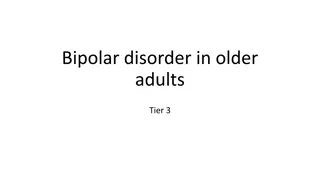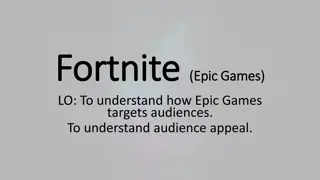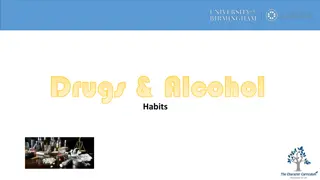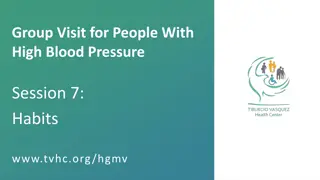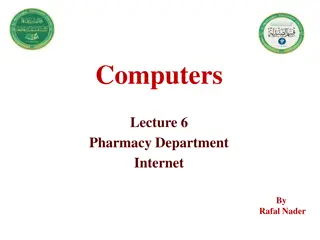Understanding Internet Gaming Disorder and Excessive Gaming Habits
Explore the prevalence of gaming in Canada, statistics on gaming habits, and insights into Internet Gaming Disorder. Learn about the impact of excessive gaming on individuals and ways to address problematic gaming behaviors.
Download Presentation

Please find below an Image/Link to download the presentation.
The content on the website is provided AS IS for your information and personal use only. It may not be sold, licensed, or shared on other websites without obtaining consent from the author. Download presentation by click this link. If you encounter any issues during the download, it is possible that the publisher has removed the file from their server.
E N D
Presentation Transcript
Problem Gaming/Excessive Internet Use Stephanie Campoli Outreach Counsellor -ASYR
Quick Facts about Gaming in Canada 58% of Canadians are gamers (46%female, 54%male) 31 years old is the age of the average Canadian Gamer In 2010, there were 2 times more reported gamers than in 1998 Canadians spend 2 hours and 20 minutes/day playing games (2010) Sources: ESA (2013), Essential Facts About Video Gaming in Canada; Statistics Canada (2010), General Social Survey: Time Use, http://bit.ly/oFcBvq.
Quick Facts about Gaming in Canada About 105 600 (10.3%) of Ontario students (grades 7-12) have a video gaming problem. Of these, 88 400 are males and 17 200 are females. The number of students in ontario with a video gaming problem is equivalent to about 6 Air Canada Centres filled to capacity at a Toronto Maple Leafs Game!
The average smart phone user - The average user reaches for their phone at 7:31am - These users check personal emails and Facebook before they get out of bed - The average person picks up their phones more than 1,500 times each week (over 200 times per day) - Average owners use their phone for three hours and sixteen minutes a day - Source: http://www.dailymail.co.uk/sciencetech/article-2783677/How-YOU-look-phone-The- average-user-picks-device-1-500-times-day.html#ixzz3UeNtfm5l
Internet Gaming Platform games (Super Mario Brothers) Sports games First Person Shooter (Call of Duty) Role Play Games (World of War craft) Fighting games Simulation games ( The Sims) Puzzle Games (Tetris, Candy Crush) Combination /Hybrid Games
Internet Gaming disorder Most people use the internet in ways that enhance their lives. (connecting with family, school, work, entertainment and shopping) It can become problematic when it interferes with one s ability meet expectations, maintain relationships, attend work/school etc.
IGD as a catch-all Social networking (Twiter, Facebook, instagram) Digital entertainment media (Streaming, YouTube) Blogging and researching Playing Online Games
Tips for Healthy Gaming/Internet Use Priorities (e.g; homework before gaming) Turn off the computer or smart phone at a certain time each night Set a limit on daily play Keep tech devices away from your bedroom at night Be aware of things that might trigger you Don t eat in front of your device Have tech free challenge days Play games that have less addictive qualities Pay attention to time and what you do online Listen to loved ones who may recognize the problem first Maintain a log of daily video game/tech use Avoid using gaming/tech use as a coping tool
Behavioural Addiction vs. Substance Abuse Similarities Coping mechanism Progression Negatively impacts mood e.g. depression,mood swings Chasing -high/win/rewards/levels Preoccupation Use of rituals Loss of time-blackouts/brownouts e.g. lose track of time, dissociation
Behavioural Addiction vs. Substance Abuse Differences Gamblers/gamers are not impaired Physical Dependence Gamblers/gamers can not overdose Gambling / IGA can be more hidden Less stigma Online activities needed for many areas of life






